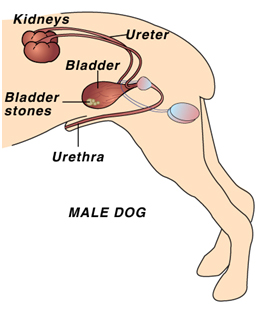These stones can also be found in the kidneys and in the tubes connecting the kidneys to the animal s bladder ureters.
Cystine bladder stones in dogs.
Urolithiasis affects both dogs and cats and are primarily found in adult animals.
Cystine uroliths also referred to as calculi are stones within the urinary tract composed of the amino acid cystine a breakdown product of proteins.
Cystine urolithiasis is most common in male dogs with an average age of onset of three to five years.
Bladder stones uroliths or cystic calculi are rock like formations of minerals that form in the urinary bladder and are more common than kidney stones in dogs.
Cystine bladder stones appear to be the result of a genetic abnormality that prevents a dog from reabsorbing cystine from the kidneys.
In many cases the specific type of crystal involved can be seen in a sample of urine viewed under the microscope.
If struvite is the diagnosis a veterinarian will treat the underlying cause.
When the stones are made up of cystine a normal compound found in the body they are called cystine stones.
Dogs are more susceptible to bladder stones than kidney stones and in rare occurrences can develop bladder stones that are made up of cystine stones.
Urinary tract kidney stones called urolithiasis in veterinary terms are stones made up of minerals which usually form in the kidneys and develop in the bladder.
A somewhat rare form of urolith in the dog is composed of cystine crystals.

